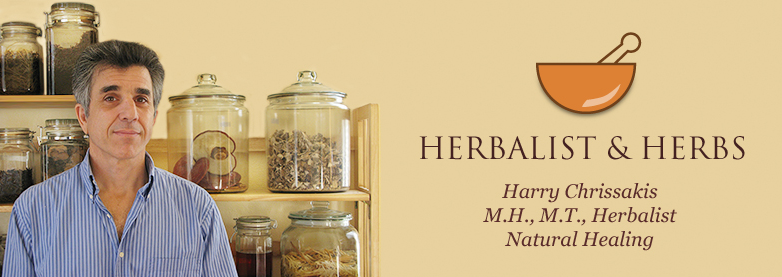by Harry Chrissakis Herbalist, M.H. M.T. Natural Healing
HERBALIST AND HERBS
Most of the tonic herbs that I will mention in this article are considered adaptogenic. There will be few exceptions and those exceptions will be mentioned.
Long term chronic disease produces distortion in the 2 control centers that regulate our bodily function. Those 2 mechanisms are the central nervous system (including the autonomic nervous system) and the central hormonal axis. The immune system functioning well is directly related to how these two systems deal with stress response.
Long term stress is the result of chronic disorder and this in turn alters how our body works. Stress response has been studied in depth since the ’50s, mostly in Russia. The man who did the original studies on stress response was Hans Selye in the late 30’s. His work on defining stress response is still valid today. So science has lots of information on Stress Response and its chemistry.How that translates into treatment strategies, in terms of standard practice allopathic medicine leaves much to be desired.
All of our top four diseases (Cancer, Heart Disease, Stroke, and Diabetes) have generally been in progress for a long time in our bodies before they become a full blown diagnosed disorder. Many of the underlying factors that help create these diseases are the same. These are the areas I wish to address, and how the use of tonic/ adaptogenic herbs can fit into a successful treatment protocol.
In the world of tonics, adaptogenic herbs are at the very top. They balance, strengthen and increase the integration, communication and response mechanisms in the central hormonal axis (H.P.A.), central nervous system and the immune system. Some examples of these herbs are American Ginseng, Aswaganda, Schisandra. There are about 8 more in this category worldwide. Definition of adaptogens is pretty tight, so there are not many of them. Tonics, which are not considered adaptogenic, are herbs such as Codonopsis, Dong Quai,Reishi, Cordyceps. They are very good, but do not have as broad a reach as adaptogens, however they are excellent when properly applied and work well together with adaptogens.
Tonic/ adaptogenic herbs act as part of a core therapy in the treatment chronic disease. One of the reasons being the longer they are used, the better they work, and the longer we use them the better we work. All chronic disease share at least the following 2 things: inflammation and oxidative damage. Most adaptogenic herbs are both anti-inflammatory and antioxidant as well as anti allergenic and anti viral. Of greater importance is their effect on balancing stress response. As an influence, stress can be translated as excess physical or mental output (excess heat, cold, hunger, hard, long physical work, long hours of study, environmental and noise pollution, lack of sleep, the effects of chronic disease, etc.) Our body’s response to meet these demands in a balanced way is critical. Balance meaning that our body meets the requirements of the stressor and then returns back to a normal set point. Adaptogens and tonics give the body a much greater capacity to handle stress (Allostasis) and then to return to a normal set point (Homeostasis)
Modern life has such a variety and abundance of stressors that the body is pushed so hard it is never able to fully come back to rest and recovery; it is using more energy to deal with the stress than it can manufacture. This fact was recognized 50 years ago by the late great Shiatsu Master, Shizuto Masanaga. In this state, the body remains in adaptive response and never comes back to recuperation and regeneration. This is a common pattern that undermines our health and sets the stage for chronic disease.
Measuring and objectifying stress is not all that difficult. It can be done through blood, urine, or saliva testing. Long term stress alone is enough to kill us. Add in poor diet and environmental toxicity and you have a modern recipe for a disaster. Pathological Stress, long term, for those of us with a less robust genetic pool means adrenal and thyroidal burnout and a dramatically reduced functional capability (quality of life). The stronger types can adjust and adjust to the stress (even live off it) until they die of a stroke or heart attack. These are physiologic facts. You can only take so much out of the account before they close it.
Clean up people’s diet, stop or reduce the flow of toxicity into their bodies, give them a well designed program of herbal medicine (wrapped around adaptogens), supplements and nutritional agents and rebuild their health. In many cases this is possible.
The analogy I like to use to describe the difference between adaptogenic/tonic herbs and the class of herbs below them (treatment herbs to be used short term) is that treatment herbs offer the cell a choice of options , say the size of a small book. Adaptogenic/tonic herbs offer an encyclopedia of information/options to the cell. Drugs, on the other hand, are designed to do something very specific and they do it well, however It is a forced situation with down sides.
In real time, that is in a clinical setting, herbs are rarely applied independently. They are always combined into specific formulas for that particular person. Herbs simply work better in formulas.
Through the use of adaptogenic/tonic herbs our ability to handle a wide variety of stressors is increased. Homeostasis (the body’s ability to return to balance) is greatly enhanced. There is an overwhelming amount of data to prove this is true.
All tonics add something to the body; all adaptogens add a lot of something to our body.
Harry Chrissakis, Herbalist, M.H. M.T. Natural Healing
www.HerbalistandHerbs.com
(530) 933-8244
By herbalistandherbs|May 2nd, 2014|Herb Profiles, Herbal Medicine|Comments Off on TONIC HERBS IN THE TREATMENT OF CHRONIC DISEASE
